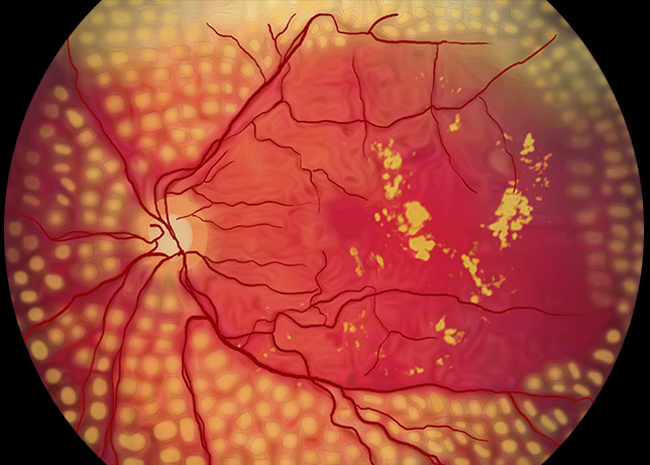 (212) 861-9797
(212) 861-9797
 (212) 861-9797
(212) 861-9797
Eye treatments for any kind of disorder that’s troubling you doesn’t have to be dramatic to make a big difference. With the advancements in laser eye surgery technology, a simple, painless procedure such as panretinal photocoagulation or PRP can save your vision for years to come without devastating consequences. The best way to ensure effective treatment is to rely on the most qualified ophthalmologists in NYC at Vitreous Retina Macula Consultants of New York. These laser eye surgery doctors have offices in Westchester, Brooklyn and Manhattan. They offer PRP and other laser eye surgery options as effective treatments. No matter what kind of issue you may be having with your eyes, you can find a solution at VRMNY. Call for a consultation today.
Panretinal photocoagulation, referred to as PRP, is a minimally invasive laser eye surgery used to treat disorders that affect your retina. By the time you reach age 40, you may have already developed retinal problems, which PRP adequately addresses. It’s estimated that about 64 percent of Americans suffer from at least one form of eye condition that causes problems with the vision.

According to the National Institutes of Health, as many as 21 percent of those over the age of 40 suffer retinal disorders. A problem with a retina threatens the vision in that eye, as you can’t see without a functioning retina. Protect your eyesight with regular checkups with an eye specialist.
When performed by experienced ophthalmologists, regular dilated eye examinations catches eye and vision problems before they become serious. That’s when early intervention is most successful. Consulting the best laser eye surgery doctors, like those at Vitreous Retina Macula Consultants of New York (VRMNY) ensures the continuous health of your eyes. Conveniently located in Manhattan, Brooklyn and Westchester, These expert eye doctors offer 24-hour on-call support, with most sessions lasting less than an hour.
I just love Dr. Klancnick. He is caring, but more than that, he has taken the fear out of going to my Retina doctor. I now get injections directly into my eye, and needless to say this is a scary experience. Dr. Klancnick explains everything to me about the procedure and shows me my improvement. I was so lucky to find him when I moved back to Brooklyn. As I praise him, I must also praise his kind and professional staff. They are great!!!
JODI B GooglePRP treats problems associated with retinal ischemia. This condition affects the input and output of the blood flow of the retina. You usually get this problem due to another retinal condition, such as central retina vein occlusion, branch artery or vein occlusions. If you delay getting the laser eye surgery, you may face more severe consequences, such as:
Your NYC eye doctor may also recommend PRP if you have retinal neovascularization. This condition causes an explosion of new abnormal blood vessels on the retina. The blood vessels cause the retina to swell, and blood vessels leak plasma into the surrounding tissues, leading to a dangerous condition called vitreous hemorrhage. In some cases, you may need vitrectomy to correct the problem.
Diabetes causes high blood sugar levels. If they aren’t controlled, the pressure may build up within the blood vessels of your retina. This eventually leads to retinal damage and possibly even the loss of your vision. If you have diabetes, inform your laser eye doctor. Diabetes retinopathy is a serious ocular condition that shows up in different forms, such as:
Laser surgeries like panretinal photocoagulation are the standard treatment for people suffering from diabetes retinopathy. Studies have shown that PRP decreases the risk of severe vision loss for damaged eyes 50 percent of the time. Routine eye checkups are the best way to catch this serious condition and prevent major vision loss.
Problems associated with the blood vessels carrying oxygen are the main reason for developing ocular disorders. As the demand for oxygen increases, the retina produces more blood vessels, but these may function abnormally. PRP makes thermal burns on the outer side of the retina using a mild to moderate laser beam to create a gray spot.
The PRP beam delivers about 1200 to 1500 burns in a minuscule diameter, which is enough to reduce the oxygen-needing photoreceptors in the retina. This slows down the production of the abnormal blood vessels in the retina. The thermal burns also shrink the blood vessels and encourage scarring.
For this treatment, you need to visit the office of the best laser eye doctor in NYC. The procedure can take from 15 to 30 minutes, depending on the severity of your condition. The procedure is painless and typically includes:
Your vision may stay hazy for 24 to 48 hours after your PRP treatment. You may even feel a dull ache in your treated eye. Under your doctor’s advice, you can take an over-the-counter pain reliever to reduce the temporary discomfort, which fades within the first day or two after your procedure.
The one thing you have to adhere to strictly are the checkups, as your eye doctor wants to make sure you’re healing properly. The top-notch ophthalmologists from VRMNY are always available for consultation at one of their three convenient locations in New York City. Contact the top retina doctors and experts to set up an appointment for a checkup or to get a firm diagnosis of your eye issues and the most effective treatment.
Let us help you enjoy your life
Call: (212) 861-9797To Speak With An Appointment Coordinator Now